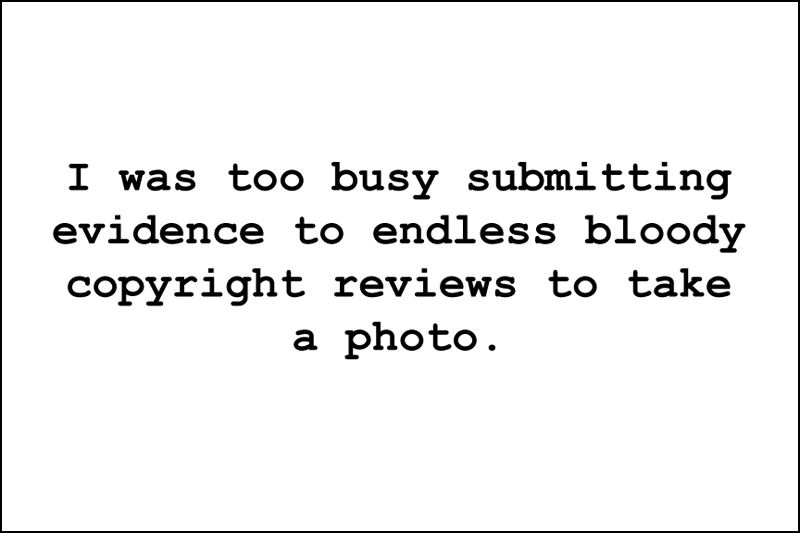Shame on me, the deadline is looming and I’ve still not submitted to the call for evidence into the feasibility of the Digital Copyright Exchange (DCE).
To address this I started work on my submission yesterday with the thought of airing my fascinating views on the subject both to the DCE call for evidence by Richard Hooper and here in my blog, but then an email came in from the Design Artists Copyright Society (DACS – see more about them here).
The email is a link to an online survey asking my views on Extended Collective Licensing (my views aren’t positive). Included in that email is a link to the Intellectual Property Office review of copyright which calls for evidence from copyright owners, creators and users, and which was set up in light of the Hargreaves review of copyright which also called for evidence from, among others, creators, creators’ agents, designers and end users of copyright materials.
Are you starting to see where I’m going with this? There appears to be an almost constant flow of reviews, calls for evidence, surveys and reviews of the results of reviews, calls for evidence and surveys around the issue of copyright. And this has been going on for years! It’s like an American freight train that’s become so long, the engine driver can see the back end of his own guards van as he goes round in a never-ending loop.
I’m beginning to suspect that the purpose of all these reviews is to keep some civil servants in endless employment, and to wear photographers and other creatives down until they just give up submitting evidence and the freeconomists win the argument by forfeit.
The basis of all this gravytrainery is that it’s been decided (by someone who might have a vested interest *coff* GOOGLE!) that copyright is unfit for purpose in the digital age, and so the reviews began.
What seems to be ignored is that copyright is perfectly fit for the digital age, but that systems for preventing its abuse haven’t been kept in line with the ease of the abuse. Neither has education kept pace with the sudden access that everyone now has to easily findable and replicable online content.
The cause of creators hasn’t been helped by the big conglomerates that control a lot of copyright works, such as the music labels, film studios and mass photo libraries, all of whom have made great strides in aggravating the people who wish to access and enjoy the products they licence. So the argument about copyright is often seen as the ‘little’ people against the goliath organisations, where in fact it’s the ‘little’ creators who create the content which is then sold on by the Goliaths. When copyright is infringed, very often it’s the creator who loses out while the big organisations continue to make healthy profits from the work of others. They also have the financial clout to defend infringements more forcefully than individual creators.
Perhaps the most worrying thing of all for creators is that every time there is a review, the evidence which is seen most prominently will be that of the many people who don’t understand why they have to pay for what they can so easily copy, and the aggregators whose protection of the works doesn’t always translate into protection for those who created the works in the first place.
All of which is to say, I’ll have to get this submission done, and complete the DACS survey, AND submit to the IPO review. After which, could I please be allowed to get on with my job instead of endlessly having to defend my livelihood? Probably need to review that.


